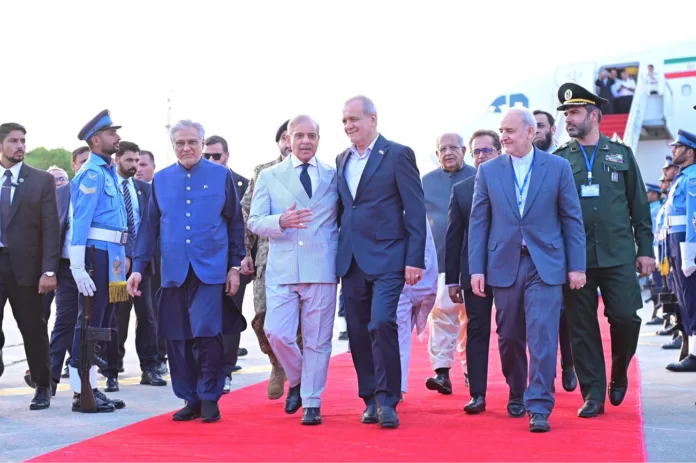✍ Ali Mehar – Pakistan
Iranian President Masoud Pezeshkian’s recent Islamabad trip is a South Asian geopolitics game-changer as Iran and Pakistan redefine their bilateral relations in the backdrop of a fast-unraveling regional environment. Pezeshkian’s three-day state visit, his first foreign trip since the Iran-Israel war last June 2025, was a fulfillment of Tehran’s strategic diplomacy and Islamabad’s endeavor to remake its regional portfolio.
On the tour, the two countries signed a series of agreements to raise trade to $10 billion a year, a sharp rise from the current $3 billion. The action is indicative of the increasing economic interdependence between the two neighbors. Security talks were also key, with the two countries signing agreements to enhance anti-terrorism cooperation on their weak and often violence-ridden 905-kilometer common border.
President Pezeshkian’s talks were beyond diplomatic niceties. His encounter with Pakistan’s highest military and intelligence command reflected the priority of defense coordination in the new bilateral consciousness. From Gen. Sahir Shamshad Mirza to ISI chief Lt. Gen. Asim Malik, it was the creation of an iron-clad security agreement that could insulate both nations from bleedover from the region.
The geopolitical background of Pezeshkian’s visit lends the visit legitimacy. Following Iran-Israel conflict—and US retaliatory attacks on Iranian nuclear installations—Tehran has been compelled to look towards neighborhood titans. The initial and persistent rejection by Pakistan and its tacit backing of Iranian reprisal had rendered it already a most unlikely but prestigious ally of Tehran in growing international isolation.
There are also high stakes for Islamabad. Restless Iran is a disaster for Pakistan’s Balochistan Province, where cross-border militancy has been the cause of headache over decades. In addition, concern at Israeli air supremacy on its western flank has introduced fresh melodies of alarm in the security calculations of Pakistan, particularly with its nuclear deterrence policy and age-old animus towards India.
Pakistan’s poorest hand in this changing calculus is that of a diplomatic mediator. Islamabad, moving in the direction of Iran, is attempting to heal its rift with Washington as well. That twin-barreled initiative was expressed by Pezeshkian’s visit as Pakistani officials considered avenues of backchannel diplomacy between the US and Tehran.
Islamabad Foreign Minister Ishaq Dar has periodically intimated Pakistan’s readiness to assist in the mitigation of U.S.-Iranian tensions, a gesture tacitly appreciated by American policymakers. The initiative is in Pakistan’s interests to promote itself as a regional stabilizer and diplomatic interlocutor in the divided world system.
This house arrangement is complemented by realignments. India-US ties have become hostile in recent months, after President Trump imposed retaliatory levies on New Delhi. In contrast, Islamabad’s restraint since April 2025 Pahalgam was greeted with enthusiasm in Washington, a testament to heightened American readiness to entertain Islamabad’s balancing act.
At the same time, Beijing, Pakistan’s and Iran’s faithful ally, would of course see this new trilateral synergy as an opportunity to further advance its Belt and Road Initiative. Shoring up bilateral ties between Islamabad and Tehran would then be a complement to further solidify China’s economic footprint in the region especially through the China-Pakistan Economic Corridor (CPEC) and Iran’s Chabahar Port.
Pezeshkian’s visit is not just a new beginning in the bilateral relationship but a strategic reorientation that can reorder the power equation in South Asia and the region. For Pakistan, the question will be how it continues to manage this balancing act between Iran, the U.S., China, and other rival powers—without selling out on its national interests in times of increasing tensions and potential conflicts.
As embers of recent tensions and diplomatic tension are slowly cooling, Pakistan’s regional diplomacy will be put to trial by times. Whether Islamabad can make the most of the hour to reap long-term strategic benefits or not is to be seen. What is sure, though, is that a new chapter of Iran-Pakistan relations has been inscribed—a chapter of compulsion on both sides, regional pragmatism, and shared will for peaceful South Asia.
